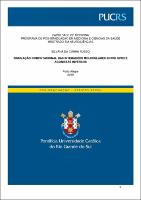| Share record |


|
Please use this identifier to cite or link to this item:
https://tede2.pucrs.br/tede2/handle/tede/8911| Document type: | Dissertação |
| Title: | Simulação computacional das interações moleculares entre GPR3 e agonistas inversos |
| Author: | Russo, Silvana da Cunha  |
| Advisor: | Palmini, André Luiz Fernandes |
| Abstract (native): | As doenças neurodegenerativas são causas importantes de morbidade e mortalidade, principalmente entre a população idosa. Elas representam um grupo grande de doenças neurológicas, com padrões clínicos variados (ZUCCHELLA et al., 2018). Os tratamentos existentes apenas oferecem melhora sintomática, mas não curam a doença (GAUTHIER et al., 2018). Vários alvos terapêuticos são propostos na investigação e tratamento das doenças neurodegenerativas. Entre o grande número de alvos moleculares, os Receptores Ligados a Proteína G (GPCR) compõe um grupo de moléculas muito estudado pela indústria farmacêutica e, atualmente, responsável pelo maior número de fármacos aprovados disponíveis no mercado (HUANG et al., 2017). Recentemente, o receptor órfão GPR3, que é um membro da família GPCR, porém, do qual ainda não se descobriu o ligante endógeno, tem recebido atenção nas pesquisas em Doença de Alzheimer (LAUN et al., 2018). Hoje se sabe que está expresso em grande quantidade no Sistema Nervoso Central (SNC), e a sua relação com doenças neurodegenerativas começou a ser evidenciada em pesquisas usando modelos de Doença de Alzheimer (THATHIAH et al., 2009). Estudos recentes desvendaram fármacos ligantes de GPR3 (JENSEN et al., 2014, LAUN; SONG, 2017). A investigação das interações moleculares de GPR3 com seus ligantes recém-descobertos poderia ajudar no desenvolvimento de novos fármacos para o tratamento das doenças neurodegenerativas. A dificuldade na pesquisa dessas interações se relaciona a falta de uma estrutura tridimensional obtida por cristalografia de raios x de GPR3, fato que pretenderemos contornar usando simulações computacionais. Os métodos computacionais são consagrados na pesquisa e desenvolvimento de fármacos porque trazem agilidade à pesquisa aliada a baixo custo. |
| Abstract (english): | Neurodegenerative diseases are considered a burden to the ageing population. They represent a number of different pathologies which have different symptoms. (ZUCCHELLA et al., 2018). Until now, there was no viable treatment, just ways to alleviate the symptoms. (GAUTHIER et al., 2018). In the research of neurodegenerative diseases, several molecular targets are proposed. Among them, the G Protein Coupled Receptors (GPCR) group has been widely studied by the pharmaceutical industry, with a significant number of drugs approved to treat human diseases (HUANG et al., 2017). Recently, the orphan receptor GPR3, from the GPCR family, for which no endogenous ligand has yet been found, has been researched in Alzheimer´s Disease (LAUN et al., 2018). It is expressed broadly in the Central Nervous System, and its relation to neurodegenerative disease has been brought to light in Alzheimer´s Disease model research (THATHIAH et al., 2009). Some studies had now discovered a few ligands to GPR3 (JENSEN et al., 2014, LAUN; SONG, 2017). The investigation of GPR3 molecular interactions with its newly found ligands could help in the development of new drugs to treat neurodegenerative diseases. The main challenge in this investigation is the lack of available 3D structure for GPR3, which we intend to address using computational simulations. Computational methods bring agility and affordability to drug development. |
| Keywords: | GPR3 Receptores Ligados a Proteína G Doença de Alzheimer Neurodegeneração Neuroinflamação Canabidiol GPR3 G Protein Coupled Receptors Alzheimer´s Disease Neurodegeneration Neuroinflammation Cannabidiol |
| CNPQ Knowledge Areas: | CIENCIAS DA SAUDE::MEDICINA |
| Language: | por |
| Country: | Brasil |
| Publisher: | Pontifícia Universidade Católica do Rio Grande do Sul |
| Institution Acronym: | PUCRS |
| Department: | Escola de Medicina |
| Program: | Programa de Pós-Graduação em Medicina e Ciências da Saúde |
| Access type: | Acesso Aberto |
| Fulltext access restriction: | Trabalho será publicado como artigo ou livro |
| Time to release fulltext: | 60 meses |
| Date to release fulltext: | 03/10/2024 |
| URI: | http://tede2.pucrs.br/tede2/handle/tede/8911 |
| Issue Date: | 24-Jun-2019 |
| Appears in Collections: | Programa de Pós-Graduação em Medicina e Ciências da Saúde |
Files in This Item:
| File | Description | Size | Format | |
|---|---|---|---|---|
| DIS_SILVANA_DA_CUNHA_RUSSO_COMPLETO.pdf | SILVANA_DA_CUNHA_RUSSO_DIS | 2.23 MB | Adobe PDF |  Download/Open Preview |
Items in DSpace are protected by copyright, with all rights reserved, unless otherwise indicated.




